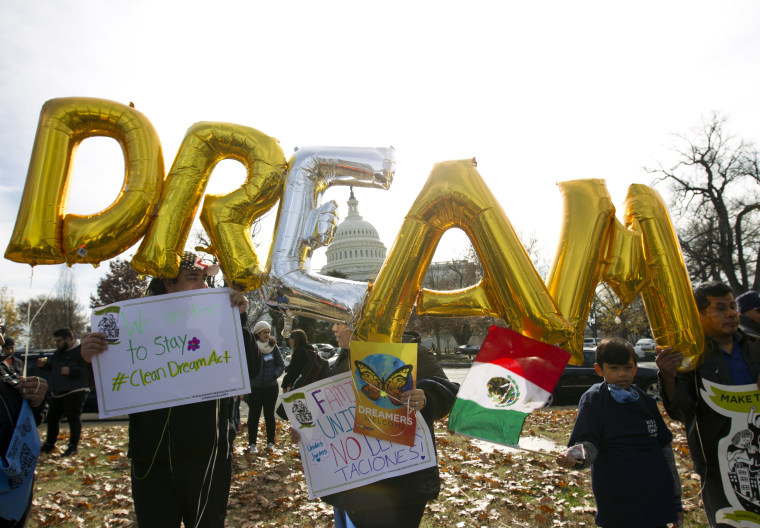With the academic year in full swing, thousands of college students across the country are unable to pay for a higher education because their legal status blocks them from scholarships or financial aid, including from the federal government, the largest provider.
But over 1,000 students a year have received scholarships from TheDream.US, an organization that seeks to eliminate obstacles to education for undocumented students. A majority of this year’s 1,070 scholarship recipients — 71 percent — are the first in their families to go to college.
The scholarships pay all tuition and fees, and in some cases also room and board, and are funded through a variety of donations, including from foundations and private donors.
“It doesn’t make any sense that as soon as you work hard and finish high school, you hit this brick wall. If not for this money, these students would not be able to go to school,” said Gaby Pacheco, program director for advocacy and communication. Pacheco is a former recipient of DACA, the program that allows young people who came to the U.S. illegally or stayed after visas expired to remain in the U.S. without fear of deportation.
“These students are very motivated and understand the power of education. They want to give back," Pacheco said. "They understand the importance of being in their communities; when given the opportunity they run with it.”
The average incoming GPA of these “DreamUS Scholars” is 3.4, and 20 of them were either valedictorians or salutatorians in high school.
Liliana Alvarado considers the scholarship program a lifesaver. Alvarado came to the United States from Mexico when she was 5 and didn’t know she lacked legal documentation until she was 16 and tried to get a driver’s license.
“I needed a Social Security number and I didn’t have one and that’s when my mother told me," Alvarado said. "That’s when I realized that I wouldn’t be able to go to college, which had been my dream. I felt like I didn’t have any options.”
After graduating from high school, Alvarado worked in a variety of odd jobs — including in a laundromat and as a waitress — while she tried to figure out what to do. “It was a real hard time mentally because I felt like I wasn’t getting anywhere and that there was no hope,” she said.
Alvarado heard about the scholarship and applied. She said it has completely changed her life. Alvarado enrolled in college — Oglethorpe University near her home in Atlanta — and is currently majoring in journalism, the first one in her family to pursue a higher education degree.
“It made me lose the shame that I was feeling of being undocumented," Alvarado said. "I’m at the place where I wanted to be for so long, and I’m very happy about it.”
Jorge, who wanted to be identified by his first name because his parents are undocumented, is a TheDreamU.S. scholar attending college in Dallas. He arrived from Mexico as a small child.
“Since I’m not a citizen, I wasn’t able to receive scholarships, and my financial aid was very low. I want to go to school but I didn’t want to bury myself or my parents in debt,” he told NBC News. “I’m repaying everything my parents did for me by going to school.”
Jorge is majoring in psychology and said he wants to eventually become a therapist. “I like the feeling when I help someone,” he said.
The political uncertainty surrounding the DACA program — which the Trump administration is pushing to end — is very much on Jorge’s mind as a recipient. The Supreme Court is expected to decide the program's fate this term.
The scholarship money is helping Jorge stay focused on schoolwork. “It keeps my mind off of that and the fact that I’m in school means I’m able to show that you can get out of any situation as long as you work hard,” he said.
The City University of New York system, the country’s largest urban university system with a total enrollment of more than 275,000 students on 25 campuses, is one of the scholarship program participants.
CUNY Chancellor Félix Matos Rodríguez said it fits perfectly with the university’s mission of serving a diverse population — nearly a third of the students are Latino — including many who otherwise would not be able to afford to go to college.
“The level of joy and security that this has provided is immense. Put yourself in the shoes of that undocumented student," said Matos Rodríguez, adding the scholarship programs has "done wonders" for students' self-esteem. "Many of them didn’t know their legal status until they applied to college. These are students who thought that every door was closed to them."
More important, the scholarship program is successful, with a 90 percent retention rate, Matos Rodríguez said,
Other “partner colleges” include Arizona State University, San Jose State University in California, the University of Texas at El Paso, Miami Dade College in Florida, George Mason University in Virginia and Rutgers University in New Jersey.
Another round of applications for the 2020-21 academic year will be accepted beginning Nov. 1.
Follow NBC Latino on Facebook, Twitter and Instagram
